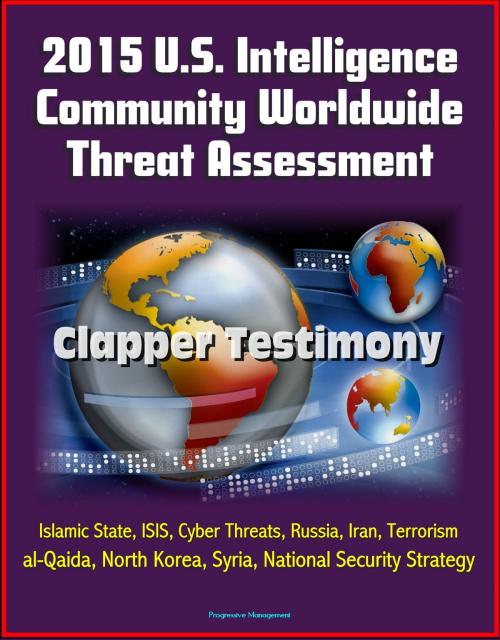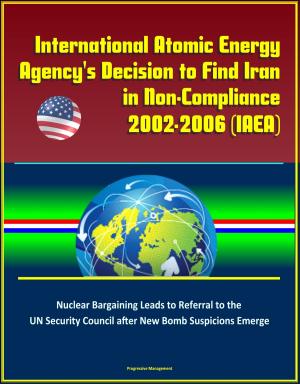2015 U.S. Intelligence Community Worldwide Threat Assessment: Clapper Testimony: Islamic State, ISIS, Cyber Threats, Russia, Iran, Terrorism, al-Qaida, North Korea, Syria, National Security Strategy
Nonfiction, Social & Cultural Studies, Political Science| Author: | Progressive Management | ISBN: | 9781311422743 |
| Publisher: | Progressive Management | Publication: | February 26, 2015 |
| Imprint: | Smashwords Edition | Language: | English |
| Author: | Progressive Management |
| ISBN: | 9781311422743 |
| Publisher: | Progressive Management |
| Publication: | February 26, 2015 |
| Imprint: | Smashwords Edition |
| Language: | English |
Director of National Intelligence James R. Clapper Jr. presented the 2015 annual U.S. intelligence community worldwide threat assessment in Congressional testimony on February 26, 2015. In the published report, Clapper provides a thorough review of the status of possible threats from a wide variety of nations and terror groups. In addition to the 2015 assessment, this compilation includes the 2014, 2013, and 2012 assessments for comparison and historical reference, plus important additional material, including the 2015 Defense Intelligence Agency worldwide threat assessment, the Obama White House National Security Strategy issued in early February 2015, remarks by National Security Advisor Susan Rice on the NSS, and dozens of statements on national security and the intelligence community from expert witnesses and officials.
Obviously, the Islamic State (ISIS, or ISIL) is a major focus of these assessments, along with cyber threats from Russia, China, Iran, and North Korea. Other topics covered: Cyber * Counterintelligence * Terrorism * Weapons of Mass Destruction and Proliferation * Space and Counterspace * Transnational Organized Crime * Economics and Natural Resources * Human Security * REGIONAL THREATS * Middle East and North Africa * Iraq * Syria * Islamic State of Iraq and the Levant * Iran * Libya * Yemen * Lebanon * Egypt * Tunisia * Europe * Turkey * Key Partners * Russia and Eurasia * Russia * Ukraine, Moldova, and Belarus * The Caucasus and Central Asia * East Asia * China * North Korea * South Asia * Afghanistan * Pakistan * India * Sub-Saharan Africa * West Africa * Sudan * South Sudan * Nigeria * Somalia * Lord's Resistance Army * Central African Republic * The Sahel * Latin America and the Caribbean * Cuba * Central America * Venezuela * Haiti
Counterintelligence - We assess that the leading state intelligence threats to US interests in 2015 will continue to be Russia and China, based on their capabilities, intent, and broad operational scopes. Other states in South Asia, the Near East, and East Asia will pose increasingly sophisticated local and regional intelligence threats to US interests. For example, Iran's intelligence and security services continue to view the United States as a primary threat and have stated publicly that they monitor and counter US activities in the region. Penetrating the US national decisionmaking apparatus and Intelligence Community will remain primary objectives for foreign intelligence entities. Additionally, the targeting of national security information and proprietary information from US companies and research institutions dealing with defense, energy, finance, dual-use technology, and other areas will be a persistent threat to US interests. Non-state entities, including transnational organized criminals and terrorists, will continue to employ human, technical, and cyber intelligence capabilities that present a significant counterintelligence challenge. Like state intelligence services, these non-state entities recruit sources and perform physical and technical surveillance to facilitate their illegal activities and avoid detection and capture.
Director of National Intelligence James R. Clapper Jr. presented the 2015 annual U.S. intelligence community worldwide threat assessment in Congressional testimony on February 26, 2015. In the published report, Clapper provides a thorough review of the status of possible threats from a wide variety of nations and terror groups. In addition to the 2015 assessment, this compilation includes the 2014, 2013, and 2012 assessments for comparison and historical reference, plus important additional material, including the 2015 Defense Intelligence Agency worldwide threat assessment, the Obama White House National Security Strategy issued in early February 2015, remarks by National Security Advisor Susan Rice on the NSS, and dozens of statements on national security and the intelligence community from expert witnesses and officials.
Obviously, the Islamic State (ISIS, or ISIL) is a major focus of these assessments, along with cyber threats from Russia, China, Iran, and North Korea. Other topics covered: Cyber * Counterintelligence * Terrorism * Weapons of Mass Destruction and Proliferation * Space and Counterspace * Transnational Organized Crime * Economics and Natural Resources * Human Security * REGIONAL THREATS * Middle East and North Africa * Iraq * Syria * Islamic State of Iraq and the Levant * Iran * Libya * Yemen * Lebanon * Egypt * Tunisia * Europe * Turkey * Key Partners * Russia and Eurasia * Russia * Ukraine, Moldova, and Belarus * The Caucasus and Central Asia * East Asia * China * North Korea * South Asia * Afghanistan * Pakistan * India * Sub-Saharan Africa * West Africa * Sudan * South Sudan * Nigeria * Somalia * Lord's Resistance Army * Central African Republic * The Sahel * Latin America and the Caribbean * Cuba * Central America * Venezuela * Haiti
Counterintelligence - We assess that the leading state intelligence threats to US interests in 2015 will continue to be Russia and China, based on their capabilities, intent, and broad operational scopes. Other states in South Asia, the Near East, and East Asia will pose increasingly sophisticated local and regional intelligence threats to US interests. For example, Iran's intelligence and security services continue to view the United States as a primary threat and have stated publicly that they monitor and counter US activities in the region. Penetrating the US national decisionmaking apparatus and Intelligence Community will remain primary objectives for foreign intelligence entities. Additionally, the targeting of national security information and proprietary information from US companies and research institutions dealing with defense, energy, finance, dual-use technology, and other areas will be a persistent threat to US interests. Non-state entities, including transnational organized criminals and terrorists, will continue to employ human, technical, and cyber intelligence capabilities that present a significant counterintelligence challenge. Like state intelligence services, these non-state entities recruit sources and perform physical and technical surveillance to facilitate their illegal activities and avoid detection and capture.















